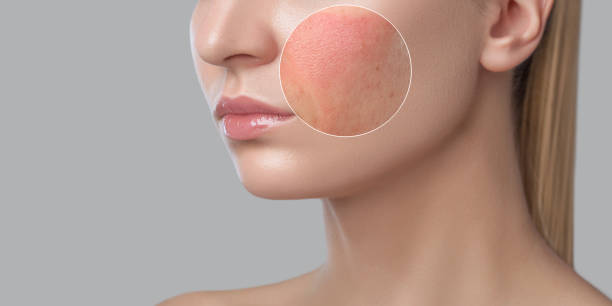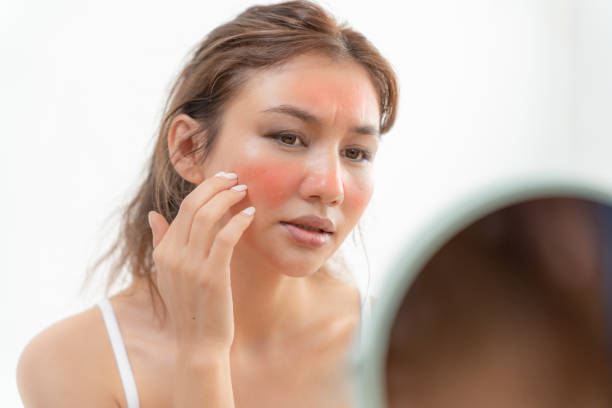I. Introduction
Skin Sensitivity – In a world where skincare is a booming industry, it’s vital to understand that not all skin is created equal. Skin sensitivity is a common yet often misunderstood condition affecting individuals in diverse ways. This article delves into the nuances of sensitive skin, offering valuable insights to help you care for your skin effectively.
II. Understanding Skin Sensitivity
Sensitive skin isn’t just a catchphrase; it’s a genuine concern for many. It refers to skin that is more prone to irritation and adverse reactions than others. Genetics, environmental factors, and the products we use all play roles in determining skin sensitivity.
Causes of Skin Sensitivity
Genetics can predispose some individuals to sensitive skin, making them more susceptible to external triggers. Environmental factors, such as harsh weather and pollution, can strip the skin of its natural defenses, leaving it vulnerable. Skincare products laden with chemicals can aggravate the skin, leading to discomfort.
Signs and Symptoms of Sensitive Skin
Sensitive skin speaks its language through various signs: redness, persistent itching, a burning sensation, or even dryness. It’s essential to recognize these signals early to adapt your skincare routine accordingly.

III. Identifying Your Skin Type
Understanding your skin type is the first step in effective skincare. Whether you have normal, dry, oily, or combination skin, knowing your skin type helps you select suitable products and treatments. Often, sensitive skin overlaps with other kinds, requiring tailored care.
Methods to Identify Your Skin Type
Determining your skin type can be done easily with a blotting paper test. All you need to do is press a blotting paper against your face in the morning. Depending on the amount of oil it picks up, you can determine your skin type. If there is little to no oil on the paper, you most likely have dry skin. If there is oil from the forehead and nose areas, you have combination skin. However, if the paper is saturated, then you have oily skin.
IV. Triggers for Skin Sensitivity
Sensitive skin is like a vigilant sentinel, quick to react to specific triggers that might go unnoticed by others. Harsh weather conditions, such as biting winter winds or scorching summer heat, can strip your skin of its natural oils, leaving it exposed and vulnerable. Air pollution laden with microscopic particles, can settle on your skin, clogging pores and causing irritation.
Allergens, ranging from pollen to certain fabrics, can spark allergic reactions, leaving your skin red and itchy. Stress, that silent saboteur of well-being, can wreak havoc on sensitive skin. When stress hormones surge, the skin’s barrier function weakens, making it more susceptible to irritation. Hormonal changes, especially during puberty or menstruation, can lead to increased sensitivity, making it essential to adapt your skincare routine accordingly.
Avoiding Triggers for Sensitive Skin
Shielding your sensitive skin requires a proactive approach. Imagine your skin as a delicate flower needing protection from harsh elements. Wearing sunscreen daily, regardless of the weather, forms an invisible shield against harmful UV rays, preventing premature aging and irritation. Opt for a broad-spectrum sunscreen with at least SPF 30, ensuring comprehensive protection. Embrace hypoallergenic products like a comforting hug for your skin. These products are specially formulated to minimize allergic reactions, making them ideal for sensitive skin.
When you choose products, check the labels diligently. Look for the reassuring words “fragrance-free” and “alcohol-free.” Fragrances, even from natural sources, can trigger adverse reactions in sensitive skin, while alcohol can be overly drying.
But it’s not just external protection that matters; your inner sanctuary issues, too. Stress, with its ability to aggravate sensitive skin, requires active management. Engage in relaxation techniques such as yoga or meditation. These practices not only calm your mind but also have a profound impact on your skin. As your stress levels reduce, your skin reactivity diminishes, allowing it to heal and renew.

V. Skincare Routine for Sensitive Skin
Caring for sensitive skin demands a gentle touch akin to the soft caress of a feather. A tailored skincare routine can transform your skin from reactive to radiant. Imagine your skincare products as the nurturing hands that cradle your skin, providing comfort and relief. Active ingredients like chamomile and aloe vera come to the rescue, their natural anti-inflammatory properties soothing sensitive skin like a healing balm. Chamomile, with its gentle yet potent effects, reduces redness and calms irritated skin, offering respite from discomfort. Aloe vera, nature’s miracle, hydrates and nourishes, promoting skin regeneration and healing.
Choosing the Right Skincare Products
Navigating the aisles of skincare products can be overwhelming, but armed with knowledge, you can make empowering choices. Begin with a mild cleanser, free from harsh chemicals and fragrances. Picture it as a gentle breeze, cleansing your skin without stripping its natural oils. Follow this with a hypoallergenic moisturizer, a source of hydration for your thirsty skin. Hypoallergenic moisturizers are like a sip of water for your skin, replenishing lost moisture without irritating.
Remember, though, your skincare routine is incomplete without the guardian of your skin – sunscreen. Select a sunscreen that’s not just a shield but a savior. Opt for one with broad-spectrum protection, safeguarding your skin against both UVA and UVB rays. SPF 30 or higher ensures robust defense, preventing sun damage and premature aging. With these carefully chosen products, your skin receives the love and care it deserves, transforming into a canvas of natural beauty.
VI. Natural Remedies and DIY Solutions
Nature offers a plethora of remedies for sensitive skin. Aloe vera’s cooling properties provide instant relief, while oatmeal’s anti-inflammatory nature calms irritated skin.
DIY Face Masks and Treatments
Create a gentle exfoliating mask using oatmeal, honey, and yogurt. Apply it once a week to slough off dead skin cells gently. A chamomile tea compress reduces redness – brew, calm, and apply with a cotton ball.
VII. Professional Treatments for Sensitive Skin
For those seeking professional help, various treatments cater to sensitive skin. Facials using hypoallergenic products, laser therapy, and microdermabrasion can provide relief.
Choosing a Reliable Skincare Professional
Research local dermatologists or skincare clinics. Read reviews and ask for recommendations. During consultations, inquire about their experience with sensitive skin and the products they use.

VIII. Lifestyle Changes for Managing Skin Sensitivity
Leading a healthy lifestyle significantly impacts sensitive skin. A balanced diet rich in vitamins and antioxidants supports skin health. Regular exercise boosts circulation, promoting a radiant complexion.
Incorporating Skin-Friendly Habits
Prioritize sleep; it’s during sleep that the skin repairs and regenerates. Stay hydrated; water flushes out toxins, keeping your skin clear. Manage stress through activities like reading, hobbies, or spending time with loved ones.
IX. Embracing Your Unique Beauty
In conclusion, understanding and embracing your sensitive skin is a journey toward self-love and confidence. By adopting a personalized skincare routine, avoiding triggers, and making lifestyle changes, you can manage sensitive skin effectively. Remember, your skin’s uniqueness is what makes you beautiful.
X. FAQs About Sensitive Skin
Q1: Can sensitive skin be cured?
Sensitive skin can’t be cured entirely, but its symptoms can be managed effectively with proper skincare and lifestyle choices.
Q2: Can stress worsen sensitive skin?
Yes, stress can trigger sensitive skin reactions. Practicing stress-reduction techniques like meditation and exercise can help alleviate symptoms.
Q3: Are natural remedies safe for sensitive skin?
Natural remedies like aloe vera and chamomile are generally safe for sensitive skin. However, it’s essential to patch-test any new ingredient to ensure you don’t have an adverse reaction.
Q4: Can sensitive skin worsen with age?
Yes, as the skin ages, it becomes thinner and loses some of its natural protective oils, making it more prone to sensitivity. Regular moisturizing and sun protection become even more critical with age.
Q5: Can certain foods worsen sensitive skin?
Yes, some foods high in sugar and processed ingredients can trigger skin inflammation, aggravating sensitive skin. Maintaining a balanced diet rich in fruits, vegetables, and whole grains can promote skin health.
Q6: Is it safe to wear makeup if I have sensitive skin?
Yes, it’s safe to wear makeup with sensitive skin, provided you choose hypoallergenic, fragrance-free products. Permanently remove makeup before bed and cleanse your skin gently to avoid irritation.
Q7: How often should I exfoliate sensitive skin?
Exfoliating sensitive skin once or twice a week is usually sufficient. Use a mild exfoliator with soft, rounded particles to avoid abrasion. Over-exfoliating can worsen sensitivity, so moderation is key.
Q8: Can allergies worsen sensitive skin reactions?
Yes, allergies to certain substances or ingredients can exacerbate sensitive skin symptoms. It’s essential to identify allergens through patch testing and avoid products containing these triggers.
Q9: Are there specific fabrics that are better for sensitive skin?
Yes, natural fabrics like cotton and silk are gentle on sensitive skin as they allow the skin to breathe. Avoid rough or synthetic materials, which can cause friction and irritation.
Q10: Can hormonal changes during menstruation affect sensitive skin?
Yes, hormonal fluctuations, especially before and during menstruation, can lead to increased skin sensitivity, acne, or rashes. Maintaining a consistent skincare routine and managing stress can help mitigate these effects.
Understanding these FAQs provides additional insights into managing sensitive skin effectively. By staying informed and taking proactive steps, you can navigate the challenges of exposed skin with confidence, ensuring your skin remains healthy and radiant.
In this comprehensive guide, we’ve explored the depths of sensitive skin, demystifying its complexities and empowering you with knowledge. By following the tips and understanding your skin’s needs, you can embark on a journey of self-care and confidence, ensuring your skin feels as beautiful as you are.
Read also .. Unveiling the Secrets of Charcoal Soap: A Deep Dive into Its Remarkable Skincare Benefits

